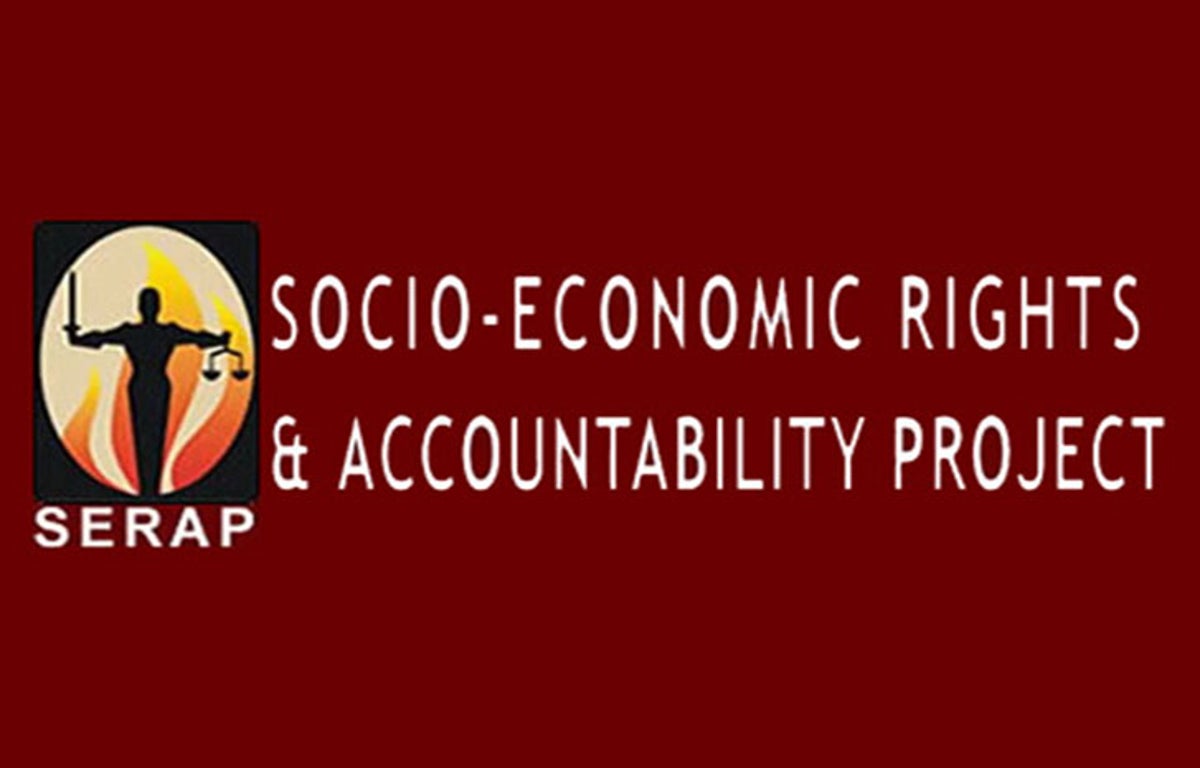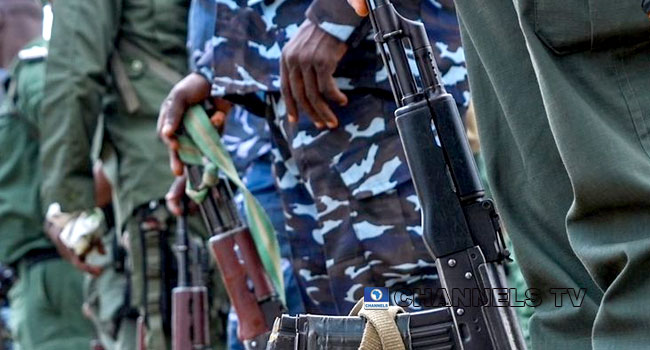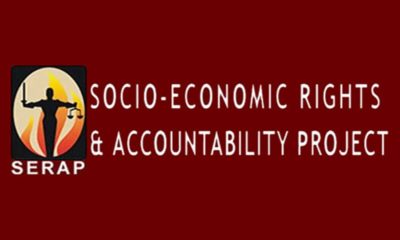Crime
Cybercrimes Act Abuses: SERAP Drags FG, States To ECOWAS Court

The Socio-Economic Rights and Accountability Project (SERAP) has filed a lawsuit against the government of President Bola Tinubu and Nigeria’s 36 governors over what it described as “the repressive use of the Cybercrimes (Amendment) Act 2024”.
The ECOWAS Court had in its judgment dated 25 March, 2022 “ordered Nigerian authorities to stop using section 24 of the Cybercrime Act 2015 to prosecute anyone on the grounds of insulting or stalking public officials online.”
The Court declared section 24 as “arbitrary, vague and repressive” and ordered Nigerian authorities “to repeal it in conformity with the country’s human rights obligations.” But while the Cybercrime (Amendment) Act 2024 has repealed section 24, it has not cured the arbitrary, vague and repressive nature of the provisions.
In the suit no: ECW/CCJ/APP/03/2025 filed last week before the ECOWAS Community Court of Justice in Abuja, SERAP is challenging “the legality and compatibility of the provisions of the Cybercrime (Prohibition, Prevention, etc.) (Amendment) Act 2024 with the rights to freedom of expression and information.”
ALSO READ: Los Angeles Wildfires: Death Toll Climbs As Firefighters Battle On
The SERAP said, “The provisions of the Cybercrimes (Amendment) Act 2024 have opened the door to criminalizing legitimate expression and punishing activists, journalists, bloggers and social media users.”
According to SERAP, “What constitutes ‘causing a breakdown of law and order’ in section 24(1)(b) of the amended legislation is unclear and undefined, threatening to punish peaceful and legitimate expression and opening the provisions up to abuse.”
The SERAP also said, “Rather than using the amended legislation to make cyberspace and its users safer, Nigerian authorities are routinely weaponizing it to curb Nigerians’ human rights and media freedom.”
The SERAP is arguing that, “The Cybercrime (Amendment) Act 2024, in addition to its arbitrary, vague and repressive section 24 provisions, broadly defines ‘cyberstalking’ in section 58 as ‘a course of conduct, directed at a specific person that would cause a reasonable person to feel fear.’”
The SERAP is also arguing that, “The provisions of the Cybercrimes (Amendment) Act 2024 represents a harshly punitive attempt to address the problems relating to stalking and harassment and fails to provide sufficient safeguards against misuse, particularly for peaceful and legitimate exercise of human rights.”
The SERAP is arguing that, “The use of section 24 of the Cybercrime (Amendment) Act 2024 to harass those who are deemed critical of the government directly threatens the staff, members and supporters of SERAP, particularly given the nature of the organization’s advocacy for human rights.”
The suit filed on behalf of SERAP by its lawyers, Kolawole Oluwadare, Mrs Adelanke Aremo and Andrew Nwankwo, read in part: “The amended legislation is abused to threaten and stifle people’s human rights and livelihoods.”
“The vague, arbitrary, and repressive provisions on ‘cyberstalking’ in section 24 of the Cybercrime (Amendment) Act 2024 are routinely abused to suppress factual reports by activists, journalists, bloggers and social media users, thereby leaving a chilling effect on human rights and media freedom.”
“Nigerian authorities not only have a negative obligation to abstain from unduly interfering with human rights and media freedom but also have a positive obligation to facilitate and protect these rights.”
“Freedom of expression is a fundamental human right and full enjoyment of this right is central to achieving individual freedom and to developing democracy. It is not only the cornerstone of democracy, but indispensable to a thriving civil society.”
“Whether labelled as cyberstalking, criminal defamation, seditious libel of government officials or false news, the provisions of section 24 of the Cybercrime (Amendment) Act 2024 disproportionately penalize the accused and inevitably limits protected public discussion and debate on matters of legitimate public concern.”
“The ECOWAS Court had on 25 March 2022 ruled that section 24 of the Cybercrime Act 2015 is arbitrary, vague and repressive and therefore, is in contravention of Article 9 of the African Charter on Human and Peoples’ Rights and Article 19 of the International Covenant on Civil and Political Rights.”
“The Court also ordered the Federal Republic of Nigeria to amend Section 24 of the Cybercrime (Prohibition, Prevention, etc.) Act, 2015 in accordance with its obligations under Article 1 of the African Charter on Human and Peoples’ Rights.”
“The National Assembly amended section 24 and other provisions of the Cybercrime 2015 in 2024 but the new Cybercrime (Amendment) Act, 2024 still criminalizes ‘cyberstalking’. The provisions remain vague, arbitrary, and frequently misused by Nigerian authorities to crackdown on human rights.”
“Since the amendment of the Cybercrime Act in 2024, Nigerian authorities at all levels have consistently used the provisions of the Cybercrime Act to harass, intimidate, arbitrarily arrest and detain and unfairly prosecute users of social media, activists, journalists, and bloggers solely for the peaceful exercise of their rights.”
“Stories published online have been deemed ‘offensive’, ‘obstructive’, ‘insulting’ or ‘annoying’ with actionable consequences under provisions of section 24 of the Cybercrime (Amendment) Act 2024 even when the stories are true and factual.”
“According to the 2023 and 2024 Freedom House Reports on Nigeria, internet freedom of expression declined due to an unprecedented pattern of arbitrary arrests and detention of bloggers after the enactment of the Cybercrime (Amendment) Act 2024.”
“There are several reports on the recent abusive use of the arbitrary, vague and repressive provisions of section 24 of the Cybercrimes (Amendment) Act 2024.”
“For example, the police filed ‘cybercrime charges’ against activist Dele Farotimi under the arbitrary, vague and repressive provisions of the Cybercrimes (Amendment) Act 2024.”
“Journalist Agba Jalingo of the Cross River Watch Newspaper was charged with ‘cyberstalking’ over a report that a relative of a former governor of Cross River State had engaged someone to sit for law exams on her behalf.”
“Chioma Okoli was arrested following her comment on Facebook complaining about the sugar content of Nagiko tomato mix. Funke Adeoye was also reportedly summoned by the police for alleged cyberbullying due to a statement she shared on her X account.”
“The Nigeria police also reportedly re-arraigned four bloggers on fresh charges of alleged cyberstalking. The police also arrested ‘a famous singer’ for alleged cyberstalking and harassing Benin Crown Prince.’”
“The provisions of the amended legislation are inconsistent with international human rights law, which requires any regulation of freedom of expression to be necessary for a legitimate purpose and to be strictly proportionate to that end.”
The SERAP is therefore asking the ECOWAS Court of Justice for the following reliefs:
A DECLARATION that the provisions of section 24 of the Cybercrime (Prohibition Prevention, ETC) (Amendment) Act 2024 are unlawful, inconsistent and incompatible with Article 9 of the African Charter on Human and Peoples’ Rights and Article 19 of International Covenant on Civil and Political Rights.
A DECLARATION that the actions of the Defendant and its law enforcement agencies in arbitrarily applying and enforcing section 24 of the Cybercrime (Prohibition, Prevention, ETC) (Amendment) Act 2024 to harass, intimidate, arrest, detain, unfairly prosecute and imprison journalists, bloggers, social media users, and other Nigerians threaten and/or violate the rights to freedom of expression, information, opinion, privacy and media freedom, guaranteed under the African Charter on Human and Peoples’ Rights, and the International Covenant on Civil and Political Rights.
AN ORDER directing the Defendant to immediately repeal and/or amend section 24 of the Cybercrime (Prohibition, Prevention, ETC) (Amendment) Act 2024 in line with Nigeria’s obligations under Article 1 of the African Charter on Human and Peoples’ Rights and other relevant human rights treaties.
SUCH FURTHER orders the Honorable Court may deem fit to make in the circumstances of this suit.
No date has been fixed for the hearing of the suit.
Crime
Court Adjourns Speed Darlington’s N300m Lawsuit Against Police

The Federal High Court in Abuja has postponed the hearing of a N300 million fundamental rights enforcement suit filed by detained singer, Darlington Achakpo, popularly known as Speed Darlington, against the Inspector-General of Police (IGP).
The case, presided over by Justice Musa Liman, was adjourned to January 27.
During Monday’s proceedings, counsel for the IGP, CSP Audu Garba, requested additional time to review a further affidavit served on him in court by Speed Darlington’s lawyer, Abubakar Marshal.
Justice Liman granted the request, allowing Garba more time to determine if the affidavit raised new legal or factual issues.
Marshal informed the court that the matter was initially scheduled for hearing but explained that while the police had served their counter affidavit on Friday, his team had only just filed their further affidavit on Monday morning. With the court’s permission, Marshal served the document to Garba in open court.
READ MORE: Police Rescue Kidnapped Akwa Ibom Ministry of Justice Director
Garba objected to proceeding immediately, stating that he needed time to study the new affidavit thoroughly before responding.
The court granted the adjournment, setting January 27 as the date for the adoption of arguments.
In the suit, marked FHC/ABJ/CS/1832/2024, Speed Darlington is challenging his arrest and detention, which he claims violates his fundamental rights as enshrined in the 1999 Constitution. Filed by human rights activist Deji Adeyanju, the suit seeks several orders, including the immediate and unconditional release of the singer or his production in court to justify his detention.
Additionally, Speed Darlington is demanding N300 million in damages, citing his alleged unlawful and continued detention since 2024.
The case highlights concerns over rights violations and has garnered significant public attention.
Crime
Police Rescue Kidnapped Akwa Ibom Ministry of Justice Director

The Akwa Ibom State Police Command has successfully rescued a director in the state’s Ministry of Justice and his niece, who were kidnapped by five armed men in December 2024.
The Commissioner of Police, CP Baba Azare, disclosed this during a press briefing at the command headquarters in Uyo on Monday, detailing how the victims were abducted and taken to a forest in Ikot Ukpong Village, Abak Local Government Area.
“On December 2024, a distress call was received that a Director with the Ministry of Justice, Akwa Ibom State, and his niece were kidnapped by five armed men.
READ MORE: FG Set To Launch Three Major Cancer Treatment Centers
Our operatives immediately swung into action and busted the kidnappers’ den in a thick forest located within Ikot Ukpong Village, Abak Local Government,” CP Azare explained.
The victims were found unharmed inside an abandoned soak-away within the forest. The operatives also recovered the victims’ car, which had been abandoned along Etinan Road, and a Toyota Sienna vehicle used in the abduction.
“Two of the suspects were neutralized during the operation. Further investigation led to the arrest of two others identified as Ability Etim Samuel, aged 45, and David Vincent Samuel, aged 36,” the commissioner added.
CP Azare urged the public to remain vigilant and provide timely information to assist the police in maintaining law and order.
Crime
Police Arrest Four Over Theft Of Akwa Ibom Fire Service Trucks

The Akwa Ibom State Police Command has apprehended four suspects in connection with the theft of four fire service trucks belonging to the state government.
This was disclosed by the Commissioner of Police, CP Baba Azare, during his inaugural press briefing held at the Command Headquarters in Uyo on Monday.
According to CP Azare, the suspects were arrested after a tip-off from a Good Samaritan revealed that the trucks had been stolen and moved to Port Harcourt, Rivers State.
READ ALSO: NWFL Kicks Off Qualification For Women’s World Club Cup 2026 With Premiership 2024/2025
Investigations revealed that the vehicles were leased out to multinational companies under a dubious arrangement.
“Based on credible information from a Good Samaritan, four of the state fire service trucks were stolen and taken to Port Harcourt, Rivers State by some officials of the service.
The Command moved to recover the said trucks, and further investigation revealed that the fire trucks were leased out to some multinational companies at the rate of ₦140,000 per truck per day for an initial period of three years,” Azare said.
He explained that the deal, initiated in 2021, was supposed to expire in 2024, with ₦80,000 of the daily rate going to the link company and ₦60,000 to the fire service officials.
However, two months before the agreement’s expiration, the police intervened, recovering the trucks and arresting four suspects.
The suspects, according to the commissioner, will soon be charged in court.
The vehicles, Azare assured, will be returned to the government for public use, while efforts are ongoing to apprehend others involved in the scheme.





















